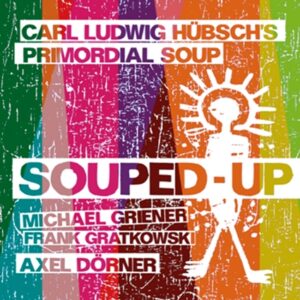CD jw jw 096 CARL LUDWIG HÜBSCH’S PRIMORDIAL SOUP
SOUPED-UP
CARL LUDWIG HÜBSCH tuba
AXEL DÖRNER trumpet
FRANK GRATKOWSKI clarinet
MICHAEL GRIENER drums
DE
Carl Ludwig Hübsch agiert als Tubist so leicht und elegant, dass man die ganze Schwerfälligkeit vergisst, die sonst dem behäbigen Instrument anhaftet. „Ich möchte die Tuba sowohl in der mittleren Lage spielen, als auch jeder Zeit in die Bassfunktion wechseln können,“ umreißt er seine Vorstellung vom emanzipierten Tubaspiel. Durch technische Tricks und Kniffe hat er sich einen Sack voll ausgefallener Klänge und Geräusche erschlossen, die in durchdachter Manier in seinen Kompositionen Verwendung finden. Um seine Stücke in Szene zu setzen, braucht es hoch spezialisierte Musiker mit eigenem Profil, einem “Self-Sound”, wie es amerikanische Jazzmusiker nennen. Trompeter Axel Dörner gehört in diese Kategorie. Er gilt seit Jahren als eine der innovativsten Stimmen auf seinem Instrument. Frank Gratkowski hat sich als hochkompetenter Holzbläser im Grenzbereich von modernem Jazz und Neuer Musik eine Namen gemacht, während Schlagwerker Michael Griener sich von Hardbop bis zum freien Spiel in den verschiedensten Trommelstilen souverän bewegt und dennoch immer hundertprozentig authentisch klingt.
Hübsch hält sie an, mit seinem Material erfinderisch um- und darüber hinausgehen, was einer Lizenz gleichkommt, es im Extremfall auch einmal ganz anders zu machen als vom Komponisten intendiert. So erhält jedes Stück durch den Gestaltungswillen, die improvisatorische Intuition und das Formgespür der Beteiligten ein jeweils anderes und dennoch ein immer wieder erkennbares Gesicht. In solch fantasievoller Verquickung von Improvisation und Komposition liegt für kreative Musiker die Herausforderung der Zukunft. Christoph Wagner
EN
Whither avant jazz in the waning years of the aughts? It’s a tough question and the attempts at extending its great lineage are often problematic and sometimes result in a bit of head-scratching. Depending on one’s frame of reference, a possible source of an especially wide shadow of influence is Anthony Braxton. All well and good, but there’s a line between influence and over-emulation; to these ears, Hübsch largely finds himself on the wrong side of that marker.
This Braxton leaning is leant even more weight by the presence of clarinetist Frank Gratkowksi, an extremely able player whose own work is also much indebted to him. With the leader on tuba, the quartet is rounded out by the always-fascinating Axel Dörner (trumpet) and Michael Griener (drums), forming a nice three-horns plus percussion grouping that certainly lends itself to the intricacies of the pieces. Right from the get-go, on Floater, Gesten Part 1, we’re in Braxton territory, a bubbling start/stop theme that nods to Tristano-era bop while pointing outwards. It’s just very hard not to hear it as an augmentation of, say, a Braxton/Lewis/Leo Smith/Altschul ensemble — the sonorities and approaches are quite similar, which isn’t to say „bad“, not at all, just a little odd in the overt referential character at such a late date. One could ask, Why bother? no matter how effectively the task is handled. And it’s all done very well, to be sure. There’s a fine nimbleness in play here, especially from Gratkowski and Dörner, who handle the jagged written lines with ease and grace and inject a decent amount of grit and spittle into what could easily have been a far more clean operation. Track three, Vier, even strays into march territory, again causing one to wonder if you’re in 1976.
The final cut, Solist am Rand, ventures the furthest from the Braxton comfort zone and is, unsurprisingly, the most successful offering, a broad palette of breath tone lamina over skittering drums that pulsates with a life of its own that owes little to obvious precursors; one wants to hear much more in this direction. Elsewhere…well, I imagine there are Braxton aficionados who are quite happy with hearing replications of his ideas by the next generation of instrumentalists and those listeners will doubtless be well pleased by what’s contained here, as engagingly and efficiently as it’s served up. But those who value the great Chicagoan’s creativity and advancement of new ideas might wonder why musicians who admire him so don’t try to do the same thing instead of imitating him.

